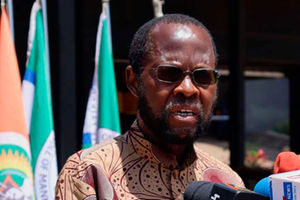From village classroom to county executive: A story of defiance

Janet Sereu, the Kajiado Education and Vocational Training executive, who rose from a P1 teacher to become a powerful voice.
What you need to know:
- Janet Sereu has risen from a primary school teacher in remote Magadi to become Kajiado County's Executive for Education and Vocational Training, breaking traditional barriers in a patriarchal Maasai community.
- Despite facing significant resistance and political intrigues in her ascent to power, she has not only succeeded in male-dominated spaces but is also paving the way for other women by advocating for inclusive leadership.
In a remote area of Maasai land, where going to school and rising to a leadership position for many women remains a far-fetched dream, one woman has defied the odds to emerge as a role model for many young girls.
Meet Janet Sereu, the Kajiado County Executive for Education and Vocational Training. To many, Janet has treaded and emerged successful in spaces where few women in pastoral communities dare to venture into leadership. She began her leadership journey in 1995 when she was posted as a P1 teacher in a remote school in Magadi, Kajiado.
Although this was difficult terrain, especially for a woman, she took the posting positively. It later turned out to be a blessing in disguise.
“This was a boarding school started by the World Bank to ensure children from pastoral communities were able to access education even as their parents moved from one place to another in search of pasture and water for their animals,” she explains. “I took up my position with pride. Despite the challenges, I was able to transform the school to become a model of excellence.”
Transforming the school from a little-known facility to a renowned centre of educational excellence marked the beginning of her transformative leadership. From the classroom, she rose to become the head teacher of the school. In tandem was her election as an official of the giant Kenya National Union of Teachers, representing Magadi teachers. A holder of a master’s degree in global business and sustainability, Janet had even greater ambitions beyond teaching. Her focus was getting into spaces where decisions affecting women and children were made. So in 2013, she decided to apply for a job at the Kajiado government.
“I managed to secure a job as the Ngong’ sub-county administrator. It was while serving in this position that my work became even more visible to the political leadership of the county.”
As the Ngong’ administrator, Janet divided the sub-county into six zones that helped her streamline service delivery.
“I worked closely with the youth, women, and the business community to deliver on my mandate. This partnership saw me give the sub-county a facelift, including building ultramodern facilities among them a market that serves the residents to date.”
Her star was shining. In 2017, the county recognised her superb performance and promoted her to the position of director of revenue in charge of user fee. “When I was put in charge of this unit, I immediately came up with strategies that resulted in us being voted among the best performers, with our revenue collection rising to Sh1.2 billion, and in the process surpassing our target.”
Her performance attracted the attention and admiration of Governor Joseph ole Lenku, who in 2022 tasked her with the responsibility of consolidating his support base in Magadi ward. “I worked with students and parents and was able to help him gain significant support during the elections.”
Her efforts were rewarded with an appointment to serve as the executive in charge of Gender, Social Services, Culture and Tourism. Although this position proved to be the most eventful and challenging, she approached it with zeal and pride. This is evident in the strides her docket made while she served as its leader before her recent deployment to the Education and Vocational Training docket. At the Gender, Social Services, Culture and Tourism ministry, she successfully pushed for increased allocation of funds to the docket.
“We already have a gender mainstreaming policy that has created a Sh40 million kitty for women's economic empowerment. This is a revolving, interest-free fund, whose proceeds will be distributed equally across all wards to benefit women entrepreneurs.” She says. “The women will propose their projects depending on where and what they feel best suits them. Those in areas with good arable land can engage in agribusiness to boost their livelihoods.”
Getting the executive position was not a walk in the park for Janet. She believes her track record both as a teacher and a senior county official gave her an edge over other candidates who were seeking appointment to the position. As a teacher, she recalls she was able to transform many schools into models of excellence.
“At Naning'oi Girls Boarding School in Mosiro, where I was posted as head teacher, I was able to improve the school's mean score in national examinations.”
She was also instrumental in championing girls’ education and denouncing child marriages among her Maasai community. Her efforts saw a reduction in the number of girls dropping out of school because of teenage pregnancies and early marriages. The girls she saved from early marriages were connected with many organisations supporting girls’ education, such as the Masai Girls Education Fund. “It is through this initiative that I was able to champion the enrolment of more girls in schools and increase their retention levels.”
Her other successes include her contribution to the establishment of Paterson Memorial Secondary School, where she served as the Parent Teachers Association treasurer. Janet played another key role in the formation of the Magadi Integrated Development Pastoralist Program that brought together all the NGOs working in Magadi.
“I came in as chair representing the community. I was involved in planning the activities for the NGOs in Magadi, especially those supporting education and water projects, to avoid duplication of projects.”
These enviable achievements have not been free of challenges. “It is through challenges that you learn and come up with innovations that bring about change."
According to Sereu, she comes from a patriarchal society that does not believe in women's leadership.
“Women have to work twice as hard to break the glass ceiling and gain acceptance in leadership.”
This was evident when she sought appointment as county executive.
“I had the necessary credentials and had previously demonstrated my abilities as director of revenue in charge of user fees in Kajiado Central. Still, I faced a lot of backlash when my name was proposed for the Trade docket. There were many political intrigues and infighting, and my name had to be dropped from the trade docket. It was later reintroduced in the County Assembly for the position of executive for Gender, Social Services, Culture, Tourism and Wildlife."
Janet notes that women in the county have for decades remained underrepresented in the highest decision-making organs, having only negligible representation of women and similarly low numbers in other positions.
“One of the struggles for women in Kajiado has been access to political leadership and decision-making positions. Currently, all women in the county assembly have been nominated, and no single woman was elected. We only have two women serving as executives.”
Janet is optimistic about the future of women's leadership in the county but emphasises this can only happen with proper support. “The women need a lot of capacity building on leadership because the Constitution has a good framework that promotes their ascendancy to leadership positions. “She advises that women must excel in their respective positions to showcase the value they bring to leadership. Women can either build or break themselves. I always tell myself the difference between success and failure is in your hands as an individual. The motivation to succeed is inside you, and you can choose to deliver or not to deliver.”
While serving in the Gender department, she was ranked among the highest-performing executives. “I first championed increased budgetary allocations to steer my mandate. Today, this is one of the best ministries in Kajiado County.”
She says for women like her to succeed, they need to involve men in the gender agenda. This will help expand the leadership space for women. “We need to embrace men to champion women's agenda. This is how they will stop seeing women as threats but as equal partners to make the world a better place for everybody.”
Sereu says when women stand out, men begin to embrace them. “I have seen my male colleagues pushing me to scale greater heights.” She stresses that young women seeking leadership positions should believe they have everything they need to ascend to whatever leadership position they desire.
AWC Features




